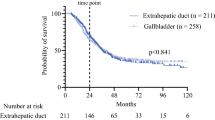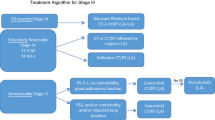Abstract
Background
The 1998 post-operative radiotherapy meta-analysis for lung cancer showed a survival detriment associated with radiation for stage I–II resected non-small cell lung cancer (NSCLC), but has been criticized for including antiquated radiation techniques. We analyzed the National Cancer Database (NCDB) to determine the impact of radiation after margin-negative (R0) resection for stage I–II NSCLC on survival.
Methods
Adult patients from 2004 to 2014 were analyzed from the NCDB with respect to receiving radiation as part of their first course of treatment for resected stage I–II NSCLC; the primary outcome measure was overall survival.
Results
A total of 197,969 patients underwent R0 resection for stage I–II NSCLC, and 4613 received radiation. Median radiation dose was 55 Gy with a 50–60 Gy interquartile range. On adjusted analysis, treatment at a community cancer program, sublobectomy, tumor size (3–7 cm), and pN1/Nx were associated with receiving radiation (odds ratio > 1, p < 0.05). The irradiated group had shorter median survival (45.8 vs. 77.5 months, p < 0.001), and radiation was independently associated with worse overall survival (hazard ratio (HR) 1.339, 95% confidence interval (CI) 1.282–1.399). After propensity score matching, radiation remained associated with worse overall survival (HR 1.313, 95% CI 1.237–1.394, p < 0.001).
Conclusions
Radiotherapy was independently associated with worse survival after R0 resection of stage I–II NSCLC in the NCDB and was more likely to be delivered in community cancer programs.


Similar content being viewed by others
References
Siegel RL, Miller KD, Jemal A. Cancer statistics, 2016. CA Cancer J Clin. 2016;66:7–30.
Ettinger DS, Wood DE, Akerley W, et al. NCCN guidelines insights: non–small cell lung cancer, version 4.2016. J Natl Compr Canc Netw. 2016;14:255–64.
Wang X, Yan S, Phan K, et al. Mediastinal lymphadenectomy fulfilling NCCN criteria may improve the outcome of clinical N0–1 and pathological N2 non–small cell lung cancer. J Thorac Dis. 2016;8:342–49.
Hofmann HS, Taege C, Lautenschlager C, Neef H, Silber RE. Microscopic (R1) and macroscopic (R2) residual disease in patients with resected non–small cell lung cancer. Eur J Cardiothorac Surg. 2002;21:606–10.
Snijder RJ, Brutel de la Riviere A, Elbers HJ, van den Bosch JM. Survival in resected stage I lung cancer with residual tumor at the bronchial resection margin. Ann Thorac Surg. 1998;65:212–16.
Ghiribelli C, Voltolini L, Paladini P, Luzzi L, Di Bisceglie M, Gotti G. Treatment and survival after lung resection for non–small cell lung cancer in patients with microscopic residual disease at the bronchial stump. Eur J Cardiothorac Surg. 1999;16:555–59.
Ginsberg RJ, Rubinstein LV, Lung Cancer Study Group. Randomized trial of lobectomy versus limited resection for T1 N0 non–small cell lung cancer. Ann Thorac Surg. 1995;60:615–22.
Meng D, Zhou Z, Wang Y, Wang L, Lv W, Hu J. Lymphadenectomy for clinical early-stage non-small-cell lung cancer: a systematic review and meta-analysis. Eur J Cardiothorac Surg. 2016;50:597–604.
Cao C, Gupta S, Chandrakumar D, Tian DH, Black D, Yan TD. Meta-analysis of intentional sublobar resections versus lobectomy for early stage non–small cell lung cancer. Ann Cardiothorac Surg. 2014;3:134–41.
PORT Meta-analysis Trialists Group. Postoperative radiotherapy in non-small-cell lung cancer: systematic review and meta-analysis of individual patient data from nine randomised controlled trials. Lancet. 1998;352(9124):257–63.
PORT Meta-analysis Trialists Group. Postoperative radiotherapy for non–small cell lung cancer. Cochrane Database Syst Rev. 2005;(2):CD002142.
PORT Meta-analysis Trialists Group. Postoperative radiotherapy for non–small cell lung cancer. Cochrane Database Syst Rev. 2000;(2):CD002142.
Bilimoria KY, Stewart AK, Winchester DP, Ko CY. The National Cancer Data Base: a powerful initiative to improve cancer care in the United States. Ann Surg Oncol. 2008;15:683–90.
Corso CD, Rutter CE, Wilson LD, Kim AW, Decker RH, Husain ZA. Re-evaluation of the role of postoperative radiotherapy and the impact of radiation dose for non-small-cell lung cancer using the National Cancer Database. J Thorac Oncol. 2015;10:148–55.
Mikell JL, Gillespie TW, Hall WA, et al. Postoperative radiotherapy is associated with better survival in non–small cell lung cancer with involved N2 lymph nodes: results of an analysis of the National Cancer Data Base. J Thorac Oncol. 2015;10:462–71.
Austin PC. An introduction to propensity score methods for reducing the effects of confounding in observational studies. Multivar Behav Res. 2011;46:399–424.
Eaton BR, Pugh SL, Bradley JD, et al. Institutional enrollment and survival among NSCLC patients receiving chemoradiation: NRG Oncology Radiation Therapy Oncology Group (RTOG) 0617. J Natl Cancer Inst. 2016;108:djw034.
Hillner BE, Smith TJ, Desch CE. Hospital and physician volume or specialization and outcomes in cancer treatment: importance in quality of cancer care. J Clin Oncol. 2000;18:2327–40.
Birkmeyer JD, Sun Y, Wong SL, Stukel TA. Hospital volume and late survival after cancer surgery. Ann Surg. 2007;245:777–83.
Bach PB, Cramer LD, Schrag D, Downey RJ, Gelfand SE, Begg CB. The influence of hospital volume on survival after resection for lung cancer. N Engl J Med. 2001;345:181–8.
Whittle J, Steinberg EP, Anderson GF, Herbert R. Use of Medicare claims data to evaluate outcomes in elderly patients undergoing lung resection for lung cancer. Chest. 1991;100:729–34.
Silvestri GA, Handy J, Lackland D, Corley E, Reed CE. Specialists achieve better outcomes than generalists for lung cancer surgery. Chest. 1998;114:675–80.
Machtay M, Lee JH, Shrager JB, Kaiser LR, Glatstein E. Risk of death from intercurrent disease is not excessively increased by modern postoperative radiotherapy for high-risk resected non-small-cell lung carcinoma. J Clin Oncol. 2001;19:3912–7.
Lally BE, Zelterman D, Colasanto JM, Haffty BG, Detterbeck FC, Wilson LD. Postoperative radiotherapy for stage II or III non-small-cell lung cancer using the surveillance, epidemiology, and end results database. J Clin Oncol. 2006;24:2998–3006.
Wang EH, Corso CD, Park HS, et al. Association between radiation dose and outcomes with postoperative radiotherapy for N0–N1 non–small cell lung cancer. Am J Clin Oncol. In press.
Acknowledgment
We are appreciative of discussion with Ying Yuan, PhD, Department of Biostatistics, MD Anderson Cancer Center. Drs. Mohamed and Fuller received funding support from the National Institutes of Health (NIH)/National Institute for Dental and Craniofacial Research (1R01DE025248-01/R56DE025248-01) and the NIH/National Cancer Institute (NCI) Head and Neck Specialized Programs of Research Excellence (SPORE) Developmental Research Program award (P50CA097007-10). Dr. Fuller received support from the Paul Calabresi Clinical Oncology Program Award (K12 CA088084-06); a National Science Foundation (NSF), Division of Mathematical Sciences, Joint NIH/NSF Initiative on Quantitative Approaches to Biomedical Big Data (QuBBD), Grant (NSF 1557679); an Elekta AB/MD Anderson Department of Radiation Oncology Seed Grant; and the Center for Radiation Oncology Research (CROR) at MD Anderson Cancer Center. Dr. Fuller has received speaker travel funding from Elekta AB. Supported in part by the NIH/NCI Cancer Center Support (Core) Grant CA016672 to the University of Texas MD Anderson Cancer Center.
Disclosure
The authors declare that they have no conflict of interest to report.
Author information
Authors and Affiliations
Corresponding author
Additional information
Todd A. Pezzi, Abdallah S. R. Mohamed, Daniel R. Gomez, Stephen G. Chun contributed equally to this manuscript.
Electronic supplementary material
Below is the link to the electronic supplementary material.
Rights and permissions
About this article
Cite this article
Pezzi, T.A., Mohamed, A.S.R., Fuller, C.D. et al. Radiation Therapy is Independently Associated with Worse Survival After R0-Resection for Stage I–II Non-small Cell Lung Cancer: An Analysis of the National Cancer Data Base. Ann Surg Oncol 24, 1419–1427 (2017). https://doi.org/10.1245/s10434-017-5786-6
Received:
Published:
Issue Date:
DOI: https://doi.org/10.1245/s10434-017-5786-6




